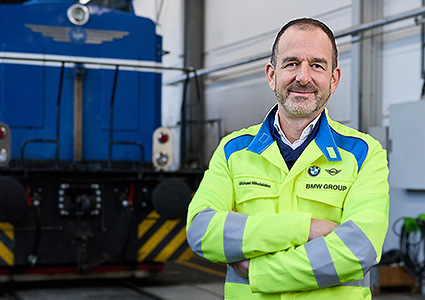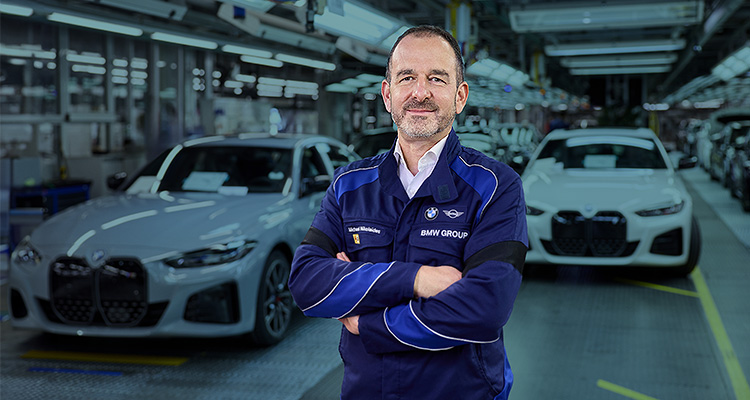Dr Michael Nikolaides of BMW Group shares his strategy for strengthening resilience and fostering flexibility
I’m a physicist by training,” begins Dr Michael Nikolaides, Senior Vice-President, Production Network, Supply Chain Management and Logistics at BMW Group. “I studied in Munich, did my thesis in Boston at Harvard University and my PhD in semiconductor and biophysics back here in Munich. I started at BMW more than 20 years ago in the engineering department where I investigated materials and nanotechnology. I then ended up in production more than 17 years ago and I’ve spent my career there since. I was responsible for the engineering and assembly of the V8 and V12 engines in our plant in Munich. Almost four years ago, I took over the responsibility for BMW’s global production network for engines and drive trains, and then, a couple of years ago, I stepped into my new role as Senior Vice President, Production Network, Supply Chain Management and Logistics.

“We produced an all-time high of almost 2.6 million vehicles in 2023 in 30 plants with more than 2000 suppliers in 4000 locations. We bring more than 30 million parts each day into our plants to enable daily production of 10,000 cars globally. In the simplest of terms, I make sure that those parts are where they need to be and are of the necessary quality. We try to find an optimum in our operations between market demand and capacity to achieve the best financial result. The logistics function is central to having a successful business in the automotive industry. Our industry has experienced and continues to experience enhanced volatility, global crises, and demand fluctuations between combustion engines and electromobility. Equally, regulations change very quickly. The automotive industry has a very complex and global supply chain and production network, and effective logistics processes are basically the way to manage that. If you’re able to do that, you gain flexibility and the capability to react to change quickly and subsequently increase resilience.
“Supplier relationships are of paramount importance and managing our suppliers is the key responsibility of our purchasing department. The supply chain is interdependent and encompasses complex relationships. Our approach is to partner with suppliers and create robust relationships by being transparent. Real time information and data, as well as digitalization are key factors for success, and particularly so during times of crisis, such as when the industry experienced semiconductor shortages. Fortunately, we have a strong relationship with Nvidia, the semiconductor company.
“As an example of the importance of leveraging digitalization, we deploy a virtual twin of all our plants and processes to conduct simulations long before the physical plant is implemented. We also employ autonomous logistics systems to handle our complex internal warehouse and production processes. We have a BMW Group spinoff company called idealworks which is revolutionizing intralogistics. As a deep tech company, idealworks has been enabling the logistics of the future by providing the most flexible and scalable robotics ecosystem,” he elaborates.
This is all part of BMW Group’s iFACTORY, its revolutionary strategy for automotive production of the future. The iFACTORY is being implemented at all BMW Group plants worldwide and will permanently change the group’s automobile production, providing a compelling answer to the challenges of the automotive transformation towards e-mobility. In implementing the iFACTORY worldwide, BMW Group is not only redefining the future orientation of its plants, but also setting new standards in climate protection and competitiveness with flexible, efficient, sustainable and digital manufacturing technologies.
BMW Group is also taking a ‘local for local’ approach with its supplier and production network. This means working with regional suppliers to source materials close to production sites. The shorter transportation routes reduce the carbon footprint of materials from the outset.
“If you don’t transport parts,” Michael continues, “then you obviously automatically save CO₂ emissions, and that is one reason why ‘local for local’ is a very important first step. Every mile you don’t drive is a good mile in terms of CO₂ emissions. Equally, if the location where you produce cars is near to where parts are produced, then you’re not only more resilient from a supply chain perspective but also reducing the negative impact of shipping costs and associated environmental implications. We always try to make decisions with a focus on total landed costs. We follow our ‘local for local’ approach with our Gen6 assemblies as well as our new plant in Debrecen, Hungary.”
BMW Group recently announced many innovations surrounding its sixth-generation battery technology. Gen6 offers a lot more range and power than the current Gen5 batteries, the result of many different advancements. From adopting a new cell structure to changing how the chassis integrates with the battery, the group continues to ambitiously pursue the next generation of electrification. Likewise, the new Hungary plant is where the all-electric Neue Klasse will roll off the production line from 2025.
Gen5 batteries, the result of many different advancements. From adopting a new cell structure to changing how the chassis integrates with the battery, the group continues to ambitiously pursue the next generation of electrification. Likewise, the new Hungary plant is where the all-electric Neue Klasse will roll off the production line from 2025.
The Neue Klasse is the start of the new BMW model generation. It represents BMW Group’s bold departure into a new era of individual mobility. Change and openness to new developments have always been part of BMW Group’s DNA. After many decades in which the company has proven its innovative strength time and again, another quantum leap is now imminent: from 2025 onwards, there will be a Neue Klasse that will set new standards for digitalization, electrification and circularity. The Neue Klasse stands for the ongoing further development of the entire company: in production, in factory planning, and in the use of new materials and processes.
“We are strongly committed to our Paris Agreement climate goals and electric vehicles are at the core of that strategy. Last year, we had more than 375,000 purely electric vehicles sold to our customers globally. Only Tesla sold more electric vehicles than us, and if you consider the premium market in which we operate, that is no mean feat.”
Likewise, BMW Group continues to explore new alternative technologies and the next generation of driving is already within view thanks to the latest global pilot project of the iX5 Hydrogen. Consisting of 100 vehicles, the fleet has been deployed across the globe with the purpose of demonstration and trialing, giving the public a rare opportunity to experience the huge potential of hydrogen for themselves. Hydrogen is a versatile energy source that has a key role to play in the energy transition process and therefore in climate protection. The hydrogen fuel cell system is further proof of BMW Group’s leading development expertise in the field of electric drive technologies. BMW Group is systematically pushing forward with development of hydrogen fuel cell technology as an additional option for locally emission-free individual mobility in the future.
“Alongside being open to new technology,” Michael concludes, “I am strongly convinced that the key to success is flexibility and the ability to react to a changing marketplace. In this way, resilience and better change management are fostered. Over the course of a couple of years, market demands might change completely, and if you’re able to pivot accordingly, then that is indicative of a successful future.”
